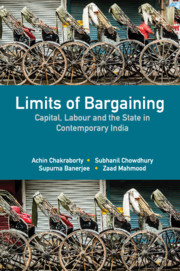Book contents
- Frontmatter
- Contents
- List of Tables
- List of Figures
- Preface
- 1 Contextualising Trade Unions and Collective Bargaining
- 2 Collective Bargaining in India: An Overview
- 3 Everyday Processes of Collective Bargaining in West Bengal
- 4 Industrial Stagnation due to ‘Labour Militancy’? A Critical Look at the Macro Evidence
- 5 Trade Unions and Working-Class Politics in Contemporary West Bengal
- 6 The State and Collective Bargaining
- 7 Conclusion
- References
- Index
5 - Trade Unions and Working-Class Politics in Contemporary West Bengal
Published online by Cambridge University Press: 05 June 2019
- Frontmatter
- Contents
- List of Tables
- List of Figures
- Preface
- 1 Contextualising Trade Unions and Collective Bargaining
- 2 Collective Bargaining in India: An Overview
- 3 Everyday Processes of Collective Bargaining in West Bengal
- 4 Industrial Stagnation due to ‘Labour Militancy’? A Critical Look at the Macro Evidence
- 5 Trade Unions and Working-Class Politics in Contemporary West Bengal
- 6 The State and Collective Bargaining
- 7 Conclusion
- References
- Index
Summary
The relationship between capital and labour is a dynamic process, varying from a peaceful relation to a conflicting one where either party, namely labour and capital, tries to safeguard its interests. This ongoing conflict is shaped by both economic and non-economic factors. In this struggle, workers are organised in trade unions that are supposed to reflect the collective interests of the working class. The relationship between the workers and the trade unions, the political beliefs of the leadership, the organisational aspects of the trade unions, the approach of the state and the general political climate all determine the outcome of the bargaining between capital and labour, in addition to the economic factors. In the last two chapters, we have looked into the issue of microlevel bargaining between labour and capital and the economic climate in West Bengal (WB), within which this bargaining is taking place. The last chapter also pointed out that the argument that ‘labour militancy’ is responsible for the industrial stagnation in the state is wrong, alluding to the fact that the strength of the trade unions in the state is actually on a decline.
In this chapter, we concentrate on the role of the trade unions and the working-class politics in WB. First, we give detailed empirical data on the strength of the trade unions in WB to further corroborate our understanding that ‘labour militancy’ is a thing of the past. However, given the change in the strength of the trade unions, is there a premium for being a member of the trade union? We try to answer these questions and locate the contours of tension between the workers and the trade unions and identify the terrain of politics in which the trade unions function. Finally, through this analysis, we also try to understand the current nature and discourse of ‘working-class’ politics in WB.
Evidence of weakening of the trade union movement in West Bengal
As has been already pointed out, WB is a state with a long history of workers’ movement governed by the Left for more than three decades. The general perception of WB in the mainstream media and academic discourses has been that of a state mired in the militant trade union movement. In this section, we try to understand the strength of the trade union movement in WB.
- Type
- Chapter
- Information
- Limits of BargainingCapital, Labour and the State in Contemporary India, pp. 75 - 103Publisher: Cambridge University PressPrint publication year: 2019



